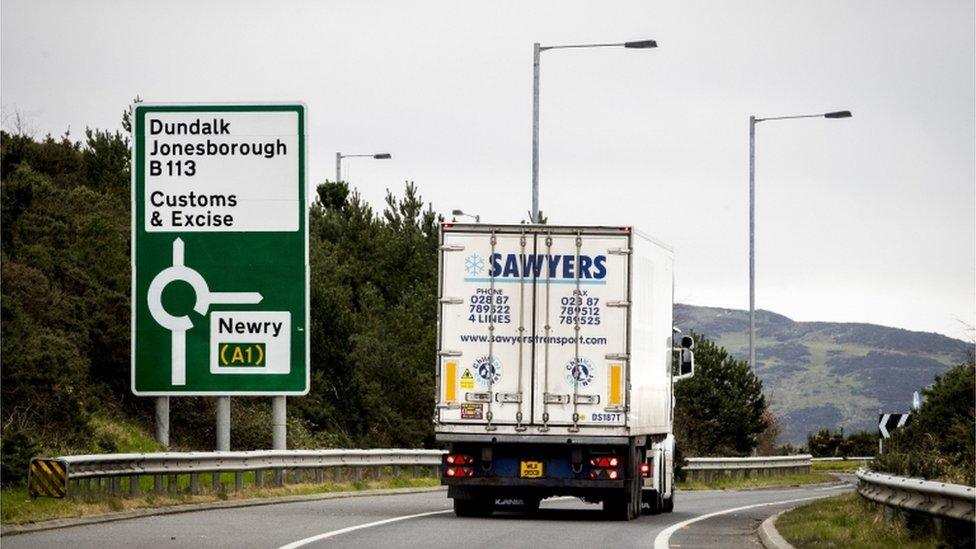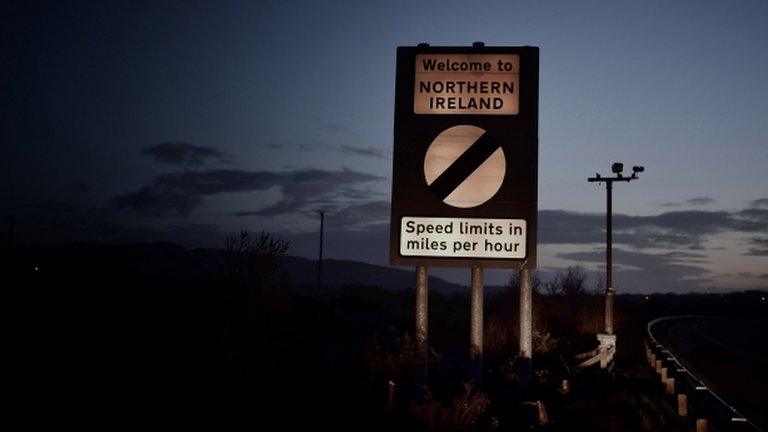Brexit: What would no-deal mean for the NI economy?
- Published
- comments

The overwhelming economic consensus is that a no-deal would be damaging to the UK
If the UK Brexits without a deal, it will cease to have a legal or regulatory framework in which to trade with the EU.
It will instead fall back on World Trade Organisation (WTO) terms - these are effectively the baseline terms of international trade.
It means UK-EU trade would suddenly be subject to tariffs on some goods and new disruptive non-tariff barriers.
The overwhelming economic consensus is that this would be damaging to the UK.
The economic damage would manifest itself in two main ways - by reducing trade with the EU and by making the UK a less attractive place to invest.
There have been two significant studies that try to quantify the impact on Northern Ireland if the UK's medium-term relationship with the EU is on WTO terms.
The first from Oxford Economics was commissioned by Stormont's Department of the Economy, external before the Brexit vote.
Growth rate
It warned that Northern Ireland would be "particularly vulnerable" to a decision to revert to WTO terms.
This was for three reasons:
Disruption to trade with the Irish Republic
Composition of manufacturing activity, which is skewed towards sub-sectors that are likely to be more negatively affected in the event of no deal
NI's relative reliance on foreign direct investment as a source of financing for investment projects.
It forecast that by 2030, a no-deal Brexit would mean the Northern Ireland economy would be between 4% and 5.6% smaller compared to a scenario in which it stayed in the EU.
It's important to note this is not a claim that the economy would be smaller in absolute terms, rather that its growth rate would be lower than it otherwise would have been.
More severe
The second main study was produced by the UK government, external in November 2018.
It is probably the most detailed no-deal analysis, using an economic model with inputs from 57 goods sectors of the UK economy.
It looks at what would happen to the UK economy over the next 15 years, compared to a scenario in which there was no Brexit.
Confused by Brexit jargon? Reality Check unpacks the basics
Like Oxford Economics, it also finds that Northern Ireland's economy would grow more slowly but it assesses the impact would be more severe with a hit of 9%.
The Confederation of British Industry (CBI) has put a cash value of £5bn on that lost output, saying it is equivalent to Northern Ireland's annual spending on hospitals, GP surgeries and other health services.
But what neither of these models captures is the potential short-term impacts on the economy.
The UK government report is explicit: "While this analysis considers Northern Ireland, it does not capture any short-term changes and does not account for specific factors relating to the border, including in the long-term."
Those economic losses may not manifest as a nice smooth curve developing over 10 or 15 years, instead there is likely to be some serious short-term damage.
'Catastrophic'
For example, we can look at a study produced by the Economic and Social Research Institute for InterTrade Ireland, external.
It shows that dairy products account for about 15% of all Northern Ireland goods exported to the Republic of Ireland.
In a no-deal scenario, those exports would be clobbered with an average tariff of 64% as well as facing new costs from non-tariff barriers.
The research suggests that could reduce Northern Ireland to Ireland dairy exports by up to 65%.
Dairy producers would seek to mitigate that loss and could, for example, sell more of their product in the wider UK market.
But the Ulster Farmers Union is clear that mitigation could only do so much.
They've described no deal as creating "an effective trade embargo" on export of animals and animal-based products to the EU, which would have "catastrophic consequences".
So while the Northern Ireland and UK economies could ultimately adapt and cope with a no-deal Brexit, certain sectors and certain places would face real pain along the way.
- Published30 July 2019

- Published12 September 2018

- Published16 October 2019

